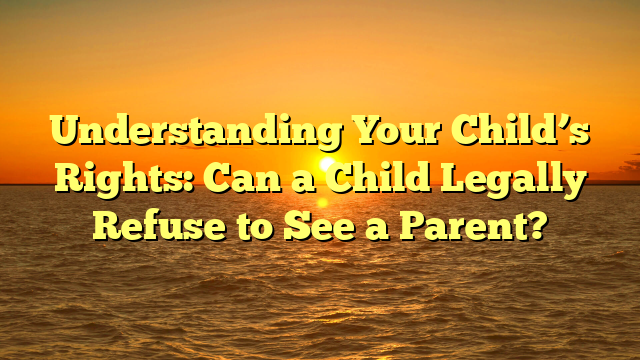Understanding Your Child’s Rights: Can a Child Legally Refuse to See a Parent?
Introduction
When parents separate or divorce, one of the most challenging aspects is determining child custody and visitation arrangements. In some cases, a child may express a strong desire to refuse to see one of their parents. This can raise questions about the child’s rights and whether they have the legal ability to refuse visitation. In this article, we will explore the topic of a child’s rights in refusing to see a parent and provide some insights into the legal considerations involved.
Understanding Child Custody and Visitation
Before delving into the question of a child’s right to refuse visitation, it is important to understand the concepts of child custody and visitation. Child custody refers to the legal and physical responsibility of caring for a child. It involves making decisions about the child’s upbringing, education, healthcare, and general welfare. Visitation, on the other hand, refers to the time a non-custodial parent spends with the child.
Legal Considerations
When determining child custody and visitation, the court’s primary concern is the best interests of the child. The court takes into account various factors such as the child’s age, their relationship with each parent, their emotional and physical well-being, and any history of abuse or neglect. The court aims to create a custody and visitation arrangement that promotes the child’s overall well-being and allows for a meaningful relationship with both parents.
Can a Child Legally Refuse to See a Parent?
The ability of a child to legally refuse visitation with a parent depends on several factors, including the child’s age and the specific circumstances of the case. In general, courts are reluctant to allow a child to refuse visitation unless there are valid reasons for doing so.
Age of the Child
The age of the child plays a significant role in determining their ability to refuse visitation. Younger children may not have the cognitive ability to make such decisions, and their preferences may not carry as much weight in court. As children grow older, their opinions and desires are given more consideration by the court. However, even older children may not have the final say in visitation matters.
Valid Reasons for Refusal
In order for a child’s refusal to see a parent to be considered legally valid, there usually needs to be a compelling reason. Valid reasons may include situations where the child’s safety or well-being is at risk, such as in cases of abuse or neglect. The court will carefully evaluate the circumstances and may order supervised visitation or other protective measures if necessary.
Parental Alienation
In some cases, a child’s refusal to see a parent may be influenced by the other parent’s actions, known as parental alienation. Parental alienation occurs when one parent intentionally or unintentionally undermines the child’s relationship with the other parent. Courts take parental alienation seriously and may intervene to address the issue and ensure the child has a healthy relationship with both parents.
Legal Remedies
If a child refuses to see a parent, the non-custodial parent can seek legal remedies to address the situation. It is important to consult with an experienced family law attorney to understand the options available in your jurisdiction. Some possible legal remedies include:
- Mediation: Mediation can help parents and children communicate and resolve conflicts in a neutral and structured environment.
- Therapeutic Intervention: In some cases, therapy or counseling may be recommended to address any underlying issues contributing to the child’s refusal.
- Court Modification: The non-custodial parent can petition the court to modify the custody or visitation arrangement based on the child’s refusal and any relevant circumstances.
- Enforcement: If a court order for visitation exists, the non-custodial parent can seek enforcement of the order through the court system.
Conclusion
While a child’s desire to refuse visitation with a parent can be challenging for all parties involved, it is essential to consider the child’s best interests and the legal framework surrounding child custody and visitation. The ability of a child to legally refuse visitation depends on various factors, including their age and the specific circumstances of the case. It is important to consult with legal professionals to understand the options available and seek appropriate remedies to address the situation.
| Pros | Cons |
|---|---|
| Protects the child’s well-being | May strain the relationship between the child and the refusing parent |
| Allows for intervention in cases of abuse or neglect | Can be emotionally challenging for all parties involved |
| Promotes the child’s best interests | May require legal intervention and court proceedings |

